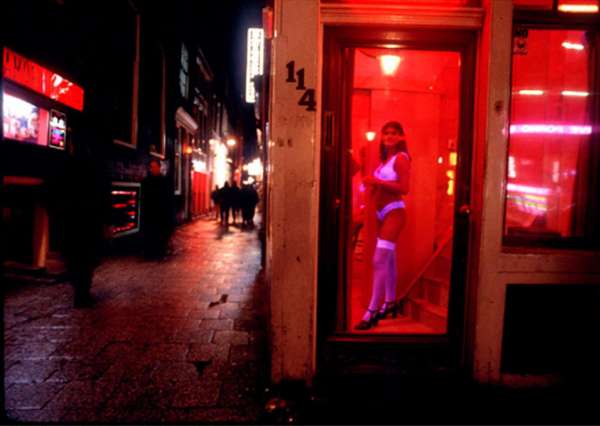 An article on the BBC website reports that a decent chunk of Amsterdam's red light district is being closed down. Which very much begs the question: Do legalised "red light districts" work?
An article on the BBC website reports that a decent chunk of Amsterdam's red light district is being closed down. Which very much begs the question: Do legalised "red light districts" work?The argument for legalising prostitution is generally that it's going to happen anyway and by legalising it you bring it out into the open and thus make it possible to regulate it and to protect the women involved. That may be true at one level - as the union De Rode Draad points out "If the windows close down, women who are being exploited will be hidden somewhere else where union representatives and health workers can't make contact with them"
But re-read that again - they're talking about health workers being unable to reach women who are being exploited - they're not talking about women who are not being exploited. And while prostitution is legal it must also be harder to get hold of and prosecute those who are exploiting women. At the same time one would hope that legalising prostitution broke the ties between sex work and other criminal activities - human trafficking, drugs and money laundering. Clearly not - Job Cohen, mayor of Amsterdam says "the trade involved exploitation and trafficking of women, and other kinds of criminal activity".
The other problem with legalising prostitution is that when you announce to the world that prostitution is legal in your city, you invite sexual tourists to visit your city seeking prostitutes, increasing the demand for sex workers and thus drawing pimps and human-traffickers to your city. This earlier run of basically the same story says that De Rode Draad (The Red Thread in English), the Amsterdam sex workers union, has 20,000 members. Now Amsterdam's population is only 743,027 (needlessly precise data from Wikipedia!) so 2.7% of the population is involved in sex work - and that's just the ones who are in the union.*
I'm sure that illegalising prostitution in a way that punishes the women participating is pretty ineffective, since the kind of people who are comfortable trafficking people into the UK and forcing them into prostitution are hardly going to worry about their subsequent well-being. In the UK it is effectively legal to be a prostitute. Running a brothel, soliciting on the streets and kerb-crawling are illegal. I'm not saying the UK has got it right, far from it, and I particularly think the way we throw trafficked women out of the country without so much as a cursory health check is disgusting.
Where I think both here and Amsterdam miss the point though is in taking the problem seriously - and that applies to a range of sex crimes, not just prostitution. It takes me only a few minutes on the internet to find evidence of illegal sexual behaviour. But the enthusiasm for pursuing these criminals - rapists, kerb-crawlers, pimps and human traffickers - is sorely lacking.
*Further note - assuming a prostitute needs an average of five clients, five nights a week to survive, that would require the men of Amsterdam - all of them, including children - to visit once to twice per week. Clearly that isn't happening - proof that the industry is being supported by sexual tourism.

3 comments:
Great post! Legalisation sounds like a simple solution to the problems prostitutes encounter, but when you look at what has actually happened following legalisation in different places the situation is clearly a lot more complicated. I wonder if you saw this article (based on a recently published book by Melissa Farley) about legal brothels in Nevada -
http://www.guardian.co.uk/g2/story/0,,2164107,00.html
There have been a few articles recently about the 'Swedish model', which prosecutes the people who pay for sex, rather than the people who sell it,and who often have little choice in the matter anyway.
This makes much more sense to me.
Post a Comment